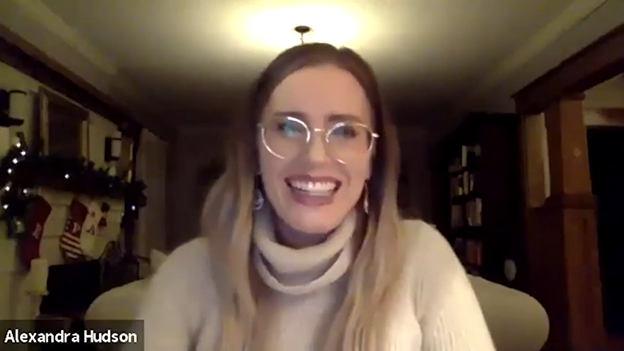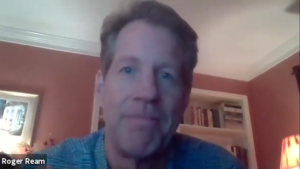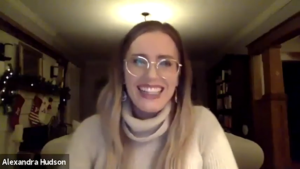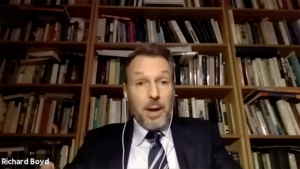
In a time when America seems to be more at odds than ever – with opposing views on everything from politics to the pandemic to patriotism – TFAS continues to educate leaders on the United States’ most important principles and promote civil discussion and open dialogue.
In November 2020, two TFAS experts led an exclusive webinar for TFAS alumni on reinvigorating civic life in the United States to discuss how civil society can return to its roots of community connections and mutual respect. The panel featured Alexandra Hudson, Novak ’19, longtime TFAS professor Richard Boyd, and TFAS president Roger Ream ’76, who opened the seminar discussing TFAS’s mission and role in the process of American civic renewal.

“For more than 50 years now, we’ve tried to create an environment in our classrooms and in our programs for civil discussion, for engagement, for motivating students to be involved in the life of their communities and the nation,” Ream said. “We really try to promote intellectual curiosity and the search for truth, and spark that interest in being engaged citizens when they finish our programs.”
Before introducing the panelists, Ream reminded listeners of the importance of loving the people around us despite contrasting viewpoints.
How Can We Revive American Civic Life?
Alexandra Hudson, a 2019 Novak Fellow and author of the forthcoming book “Against Politeness: Why Politeness Failed America and How Civility Can Save It,” began the discussion on civic renewal by remembering Marcus Aurelius, one of “history’s greatest advocates for human freedom and flourishing,” and the ancient discussions on civic life in which he participated. Hudson highlighted the belief that “the capacity for true freedom and flourishing is within each of us and can be realized when each of us choose to distinguish between what we can control and what we can’t.”
The capacity for true freedom and flourishing is within each of us and can be realized when each of us choose to distinguish between what we can control and what we can’t.” – Alexandra Hudson, Novak ’19
Hudson discussed the ease with which many people look around and blame someone or something for all the brokenness in our world today, and how this mindset greatly diminishes our capacity for civic engagement.

Convening to connect with our fellow citizens, discussing observations and ideas, cultivating meaningful human connection, fostering civic friendships, and reconstructing respect for civil society—these are the actions that will rebuild civic life and democracy.
Hudson suggests using the “Porch” method, a favorite of Marcus Aurelius, to accomplish this. The “Porch” is both a literal and metaphoric space for individuals to connect with each other and foster respectful relationships that see the value and dignity in each person.
Hudson drew a connection to the current pandemic and how it can feel difficult in these times to connect, but how that makes it all the more important to focus on what we can do rather than what we cannot when it comes to renewing civic engagement.
Civility in Perspective
TFAS professor Richard Boyd discussed different ways of thinking about civic life in America. He mentioned the fear of political fatigue, the current lament of partisanship in the U.S., and how we can look to history to understand what is happening and how to move forward.
He explained, “I’m of the school of thought that we should look to history not just to learn its lessons or avoid its mistakes, but also to put our contemporary situation in perspective.”
I’m of the school of thought that we should look to history not just to learn its lessons or avoid its mistakes, but also to put our contemporary situation in perspective.” – Professor Richard Boyd
To demonstrate this process of looking to history, Boyd called on the story of the obscure Colonel Matthew Lyon, also known as the “Mad Man of the Mountain.” Colonel Lyon served in the Revolutionary War and was later elected to Congress. He was controversial, strong-willed and polarizing. Americans at the time saw him as scandalous and seditious.

Boyd posed the question: “What does this vignette tell us about civil society?” First of all, he explained, it shows us that not much today is “unprecedented” – the things that are occurring now have happened before. Yet our institutions are resilient, so the U.S. has emerged rejuvenated, which allows us to be hopeful.
Another lesson gleaned from this story is that civic life is often set at the center, not the periphery. The people at the center of politics are often civil—they are not the polarizing figures.
“The lesson of this might be,” Boyd began, “that even in what might seem like a very dark time…it’s important to keep things in perspective and recognize that today’s uncivil conflicts might very well be, at least we hope they will be, grounds for civic renewal and civic engagement in the future.”
Looking Forward
After Hudson and Boyd introduced their perspectives on civic reinvigoration, Ream opened the floor for a Q&A session with TFAS alumni guests. The first question elicited great discussion on the issue of politics becoming all-consuming in our lives today.
Hudson believes that politics has indeed become too much of our public consciousness and has replaced the traditional touchstones of religion and community.
“Politics has filled that vacuum,” she said. “It’s become our religion, it’s become our community, and that has contributed to the tribal nature of our politics and the fervor [of today’s politics].”
Hudson believes that reviving civic life does not come from discussing politics, but rather from learning about the people around us, treating everyone with inherent dignity, and learning to coexist among deep differences as opposed to diminishing them.
Boyd also shared his thoughts on this topic. He said there is a distinction between political and civic engagement, yet people often conflate these two ideas. Civic engagement without political engagement will help reinvigorate civic life. Boyd explained that there are things that separate us, things that bond us, and things that bridge us.
“Politics separates us,” he said. “It bonds people, but what we need are things that bridge, and civic life is bridging rather than bonding.”
Politics separates us. It bonds people, but what we need are things that bridge, and civic life is bridging rather than bonding.” – Professor Richard Boyd
Hudson and Boyd then answered questions about the need for political engagement, dealing with discord, community involvement, censored speech on college campuses, how to bridge the divide between responses to civility, responsibilities of political parties, and more. Watch the recording here to uncover Hudson’s and Boyd’s thoughts on each of these issues.
This series is made possible through the generosity of the Achelis and Bodman Foundation. Their gift, made in support of our 50th Anniversary Liberty + Leadership Campaign initiative to engage and mobilize the global TFAS Alumni Network, allows alumni leaders to continue their education in liberty.
Learn more about past events in the series:
Socialism vs. Capitalism: How Stories Can Help Us Win the Battle of Ideas
Better or Worse? TFAS Alumni Predict Post-2020 New York in Alumni Panel Webinar

